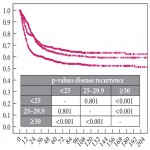From Famine to Feast. Systemic Therapy for Prostate Cancer Comes of Age.
OR The Hare Becomes the Tortoise??
 When I was a medical oncology trainee in 2001 looking for an area to specialise in my mentors told me prostate cancer was going to be the next big thing. I must admit I was dubious but now more than 10 years later this is amongst the best advice I have ever received. On a par with support Manchester United and buy property in London! Systemic treatment for prostate cancer has well and truly arrived and we are in a position where at times we are spoilt for choice.
When I was a medical oncology trainee in 2001 looking for an area to specialise in my mentors told me prostate cancer was going to be the next big thing. I must admit I was dubious but now more than 10 years later this is amongst the best advice I have ever received. On a par with support Manchester United and buy property in London! Systemic treatment for prostate cancer has well and truly arrived and we are in a position where at times we are spoilt for choice.
So how did we get here and why did it take so long. To answer the second part first we need to go back to 1941 and Huggins and Hodges ground-breaking work showing the profound effect of castration on metastatic prostate cancer. Both the original paper and the Nobel lecture are fascinating reading. Castration remains a cornerstone of the treatment of prostate cancer. The androgen receptor is one of, if not the, most dominant biological pathway in solid tumour oncology. Apart from chemotherapy for testicular cancer, another urological success, I cannot think of another systemic treatment that has such profound activity both in terms of clinical response and disease control rates. For instance androgen deprivation far surpasses the activity seen with tamoxifen in ER +ve breast cancer. So prostate cancer got off to a flier and perhaps was the hare to the tortoise when compared to other cancers, which have slowly but surely overtaken.
There was a long lull with very little positive data for metastatic prostate cancer. Why was this? Perhaps the activity of androgen deprivation set too high a bar for subsequent treatments and a sense of nihilism for those that followed. This is shown by the negative reaction to the data on docetaxel first published in 2004. The 50% PSA response rate (a decline in PSA of 50% or greater) is impressive particularly in this highly pre-treated population. More importantly docetaxel improves quality of life and provides a small but significant survival advantage against an active comparator. We now have a second chemotherapy, cabazitaxel, which again shows a significant survival advantage. Whilst chemotherapy in prostate cancer remains controversial, and worthy of a future blog, there is no doubt for a significant number of patients it provides real benefit.
Prostate cancer is leading the way for other areas of systemic therapy. Sipuleucel-T is one of the only immunotherapies to show a survival benefit in solid tumour oncology. Whilst Sipuleucel-T is controversial and has many detractors, it does have level 1 evidence to support it. During my fellowship with Phil Kantoff’s group in Boston, I saw several patients who I am convinced benefited from this treatment. Alpharadin is the first radionucleotide to show a survival advantage and is likely to become an integral part of systemic therapy for CRPC.
The drugs that have provided most excitement and the greatest benefit in day-to-day practise are abiraterone and enzalutamide. These drugs build on the work of Huggins and Hodges and show that 70 years of targeting the androgen receptor is still relevant even with castration. These drugs have changed how we describe the disease moving from ‘hormone-refractory’ to ‘castration-refractory’. Abiraterone is now licensed in the pre- and post-chemotherapy setting and it is likely that enzalutamide will follow in the not too distant future. In my own practise these drugs are game changers. Ones that provide real benefits relieving symptoms, controlling disease and allowing some men with prostate cancer to live much longer.
Who should be responsible for all these new drugs? Medical oncologists? Urologists? Nurse specialists? For me this shouldn’t be territorial. I want men with prostate cancer looked after by those with a real interest in this area. The days of people dabbling should be in the past and testicular cancer has shown us that patients do better when looked after in high volume centres. In reality men with metastatic prostate cancer have complex medical needs and only with the input from the whole multidisciplinary team are we able to give them the best care.
So systemic treatment for prostate cancer is suddenly fashionable and my mentors (Ellis and Harper) were proved right! ‘Told you so Chowdhury!’ This is only going to be the beginning with prostate cancer, which is now at the forefront of cancer research. Our understanding of the biology of prostate cancer is likely to grow exponentially and with it our ability to improve treatment. So watch this blog – to be continued…
Simon Chowdhury is Consultant Medical Oncologist at Guy’s, King’s and St Thomas’ Hospitals, London. He is actively involved in clinical trial research into urological cancers.
Comments on this blog are now closed.




Agree- you have an exciting career ahead of you to figure out how to combine and sequence these new agents. Better yet, will any molecular markers predict which drug to give and when. Care to make that prediction?
Thanks John. Yes I believe molecular profiling of prostate cancers will help to select the best drugs. Such studies are in design and will hopefully change the way we practise. All of us want to move away from treating all patients in the same way. The PI3K/AKT/PTEN pathway is probably the area of most interest at the moment and studies looking at AKT inhibitors and PI3 kinase inhibitors are ongoing.
Great blog Simon. Certainly exciting times in CRPC but it does make me wonder how we will afford the new paradigms being proposed.
Have you thoughts on cost-effectiveness here? Let me present you two extreme ends of the spectrum – Could there be an argument for better early detection, better selection of patients for treatment with curative intent and therefore higher chance of cure and less need for the expensive CRPC journey?? Or conversely, should we screen nobody, never treat early (and avoid all over treatment), save all the money we spend on localised prostate cancer and put all our dollars in the CRPC pile??!! An oncologist in Melbourne told us last year that one of the reasons he opposes all PSA testing is that we have much better palliative care now! I don’t agree and I am a fan of early detection and patients making informed choices. But I am not sure how the USA in particular is going to afford both localised and advanced prostate cancer.